(Solved) Land Law : Assignment
VerifiedAdded on 2021/02/21
|10
|2943
|44
AI Summary
Contribute Materials
Your contribution can guide someone’s learning journey. Share your
documents today.
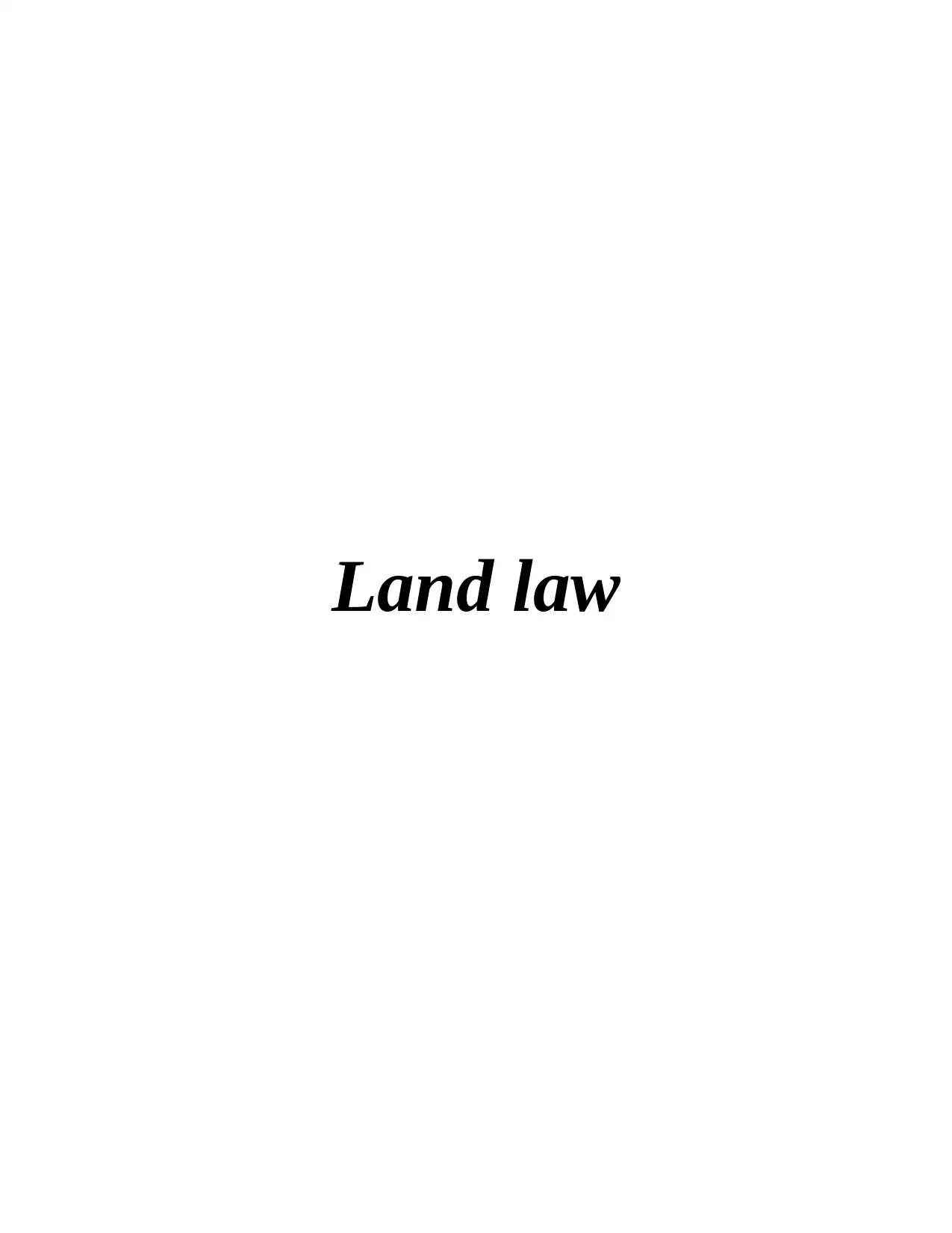
Land law
Secure Best Marks with AI Grader
Need help grading? Try our AI Grader for instant feedback on your assignments.
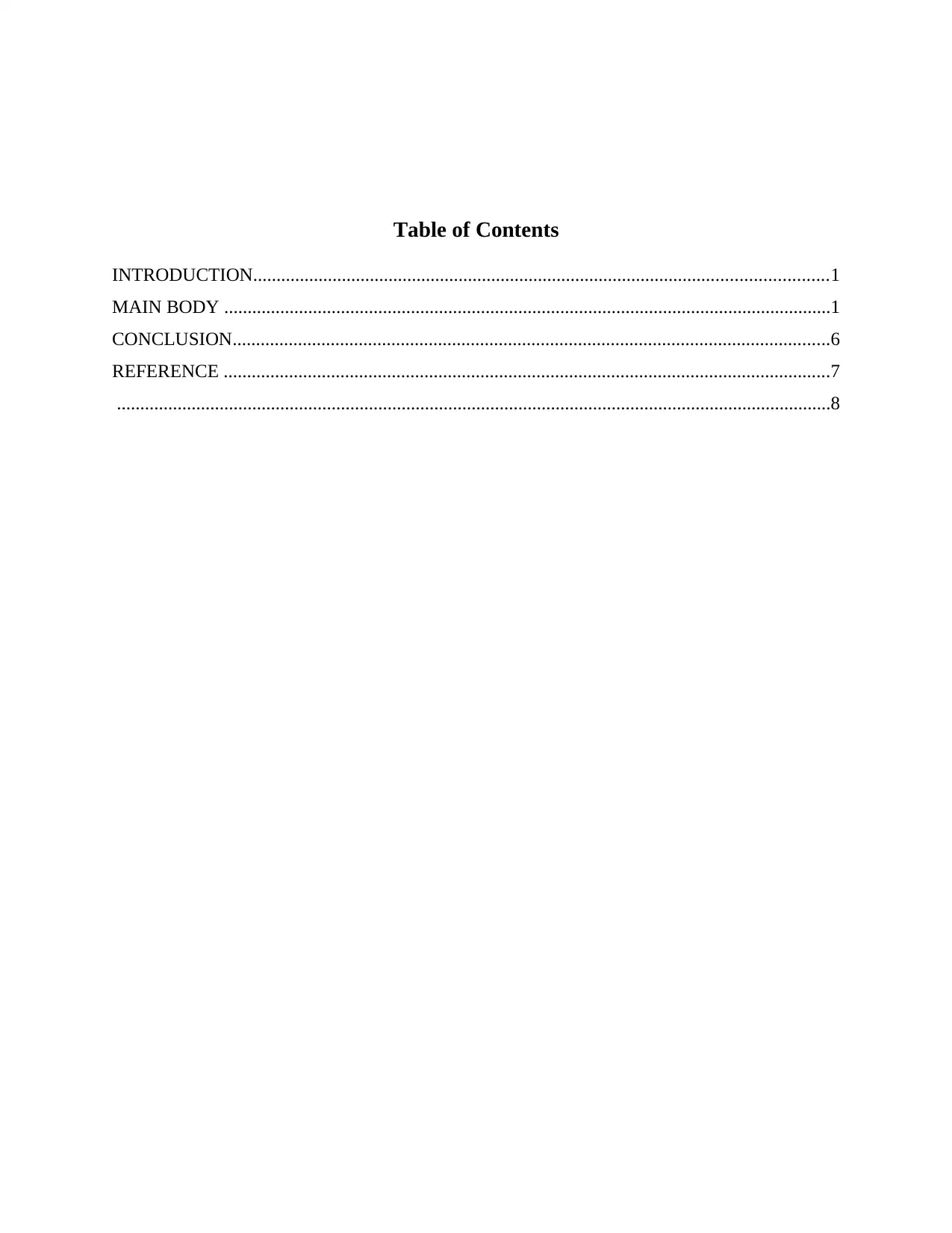
Table of Contents
INTRODUCTION...........................................................................................................................1
MAIN BODY ..................................................................................................................................1
CONCLUSION................................................................................................................................6
REFERENCE ..................................................................................................................................7
.........................................................................................................................................................8
INTRODUCTION...........................................................................................................................1
MAIN BODY ..................................................................................................................................1
CONCLUSION................................................................................................................................6
REFERENCE ..................................................................................................................................7
.........................................................................................................................................................8
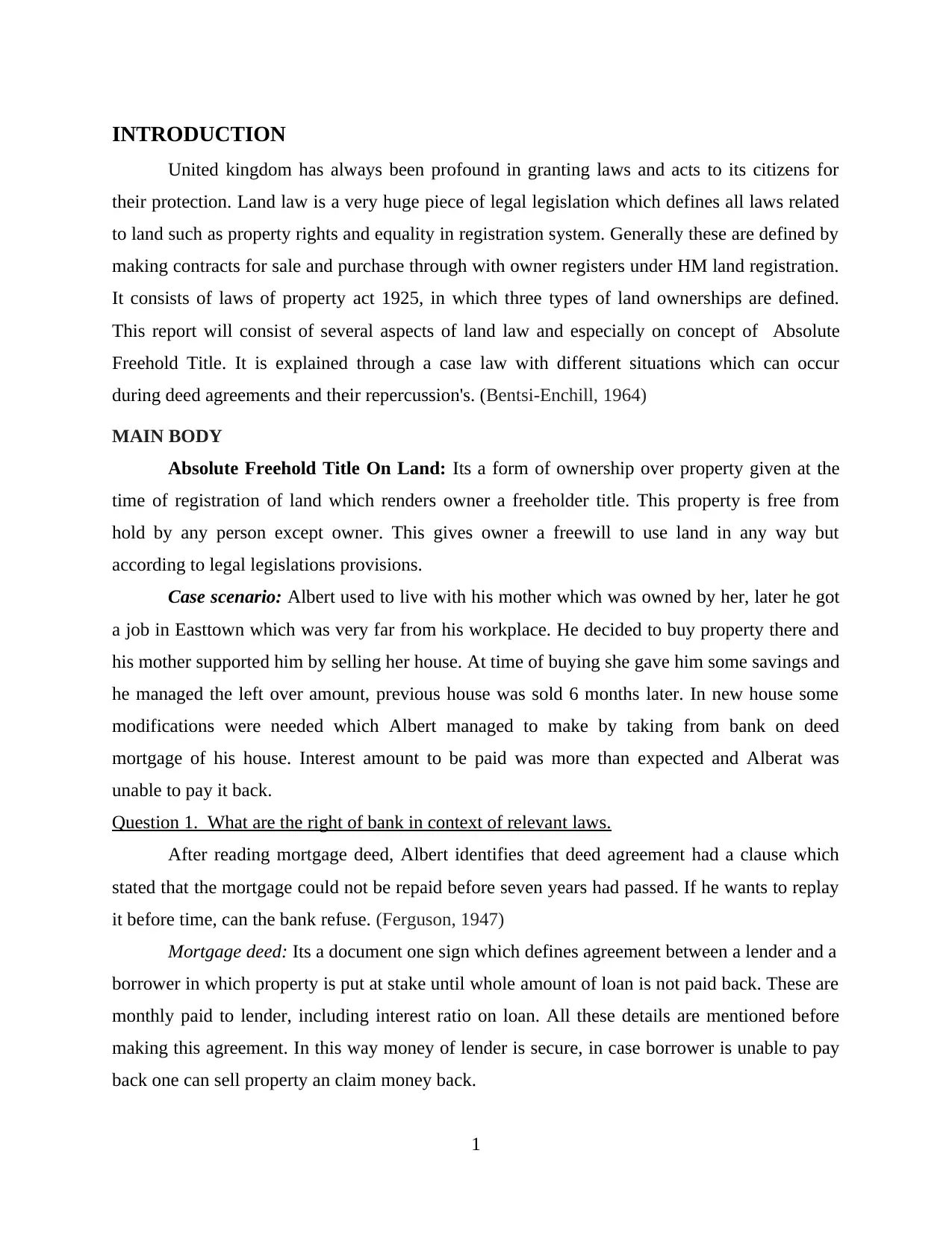
INTRODUCTION
United kingdom has always been profound in granting laws and acts to its citizens for
their protection. Land law is a very huge piece of legal legislation which defines all laws related
to land such as property rights and equality in registration system. Generally these are defined by
making contracts for sale and purchase through with owner registers under HM land registration.
It consists of laws of property act 1925, in which three types of land ownerships are defined.
This report will consist of several aspects of land law and especially on concept of Absolute
Freehold Title. It is explained through a case law with different situations which can occur
during deed agreements and their repercussion's. (Bentsi-Enchill, 1964)
MAIN BODY
Absolute Freehold Title On Land: Its a form of ownership over property given at the
time of registration of land which renders owner a freeholder title. This property is free from
hold by any person except owner. This gives owner a freewill to use land in any way but
according to legal legislations provisions.
Case scenario: Albert used to live with his mother which was owned by her, later he got
a job in Easttown which was very far from his workplace. He decided to buy property there and
his mother supported him by selling her house. At time of buying she gave him some savings and
he managed the left over amount, previous house was sold 6 months later. In new house some
modifications were needed which Albert managed to make by taking from bank on deed
mortgage of his house. Interest amount to be paid was more than expected and Alberat was
unable to pay it back.
Question 1. What are the right of bank in context of relevant laws.
After reading mortgage deed, Albert identifies that deed agreement had a clause which
stated that the mortgage could not be repaid before seven years had passed. If he wants to replay
it before time, can the bank refuse. (Ferguson, 1947)
Mortgage deed: Its a document one sign which defines agreement between a lender and a
borrower in which property is put at stake until whole amount of loan is not paid back. These are
monthly paid to lender, including interest ratio on loan. All these details are mentioned before
making this agreement. In this way money of lender is secure, in case borrower is unable to pay
back one can sell property an claim money back.
1
United kingdom has always been profound in granting laws and acts to its citizens for
their protection. Land law is a very huge piece of legal legislation which defines all laws related
to land such as property rights and equality in registration system. Generally these are defined by
making contracts for sale and purchase through with owner registers under HM land registration.
It consists of laws of property act 1925, in which three types of land ownerships are defined.
This report will consist of several aspects of land law and especially on concept of Absolute
Freehold Title. It is explained through a case law with different situations which can occur
during deed agreements and their repercussion's. (Bentsi-Enchill, 1964)
MAIN BODY
Absolute Freehold Title On Land: Its a form of ownership over property given at the
time of registration of land which renders owner a freeholder title. This property is free from
hold by any person except owner. This gives owner a freewill to use land in any way but
according to legal legislations provisions.
Case scenario: Albert used to live with his mother which was owned by her, later he got
a job in Easttown which was very far from his workplace. He decided to buy property there and
his mother supported him by selling her house. At time of buying she gave him some savings and
he managed the left over amount, previous house was sold 6 months later. In new house some
modifications were needed which Albert managed to make by taking from bank on deed
mortgage of his house. Interest amount to be paid was more than expected and Alberat was
unable to pay it back.
Question 1. What are the right of bank in context of relevant laws.
After reading mortgage deed, Albert identifies that deed agreement had a clause which
stated that the mortgage could not be repaid before seven years had passed. If he wants to replay
it before time, can the bank refuse. (Ferguson, 1947)
Mortgage deed: Its a document one sign which defines agreement between a lender and a
borrower in which property is put at stake until whole amount of loan is not paid back. These are
monthly paid to lender, including interest ratio on loan. All these details are mentioned before
making this agreement. In this way money of lender is secure, in case borrower is unable to pay
back one can sell property an claim money back.
1
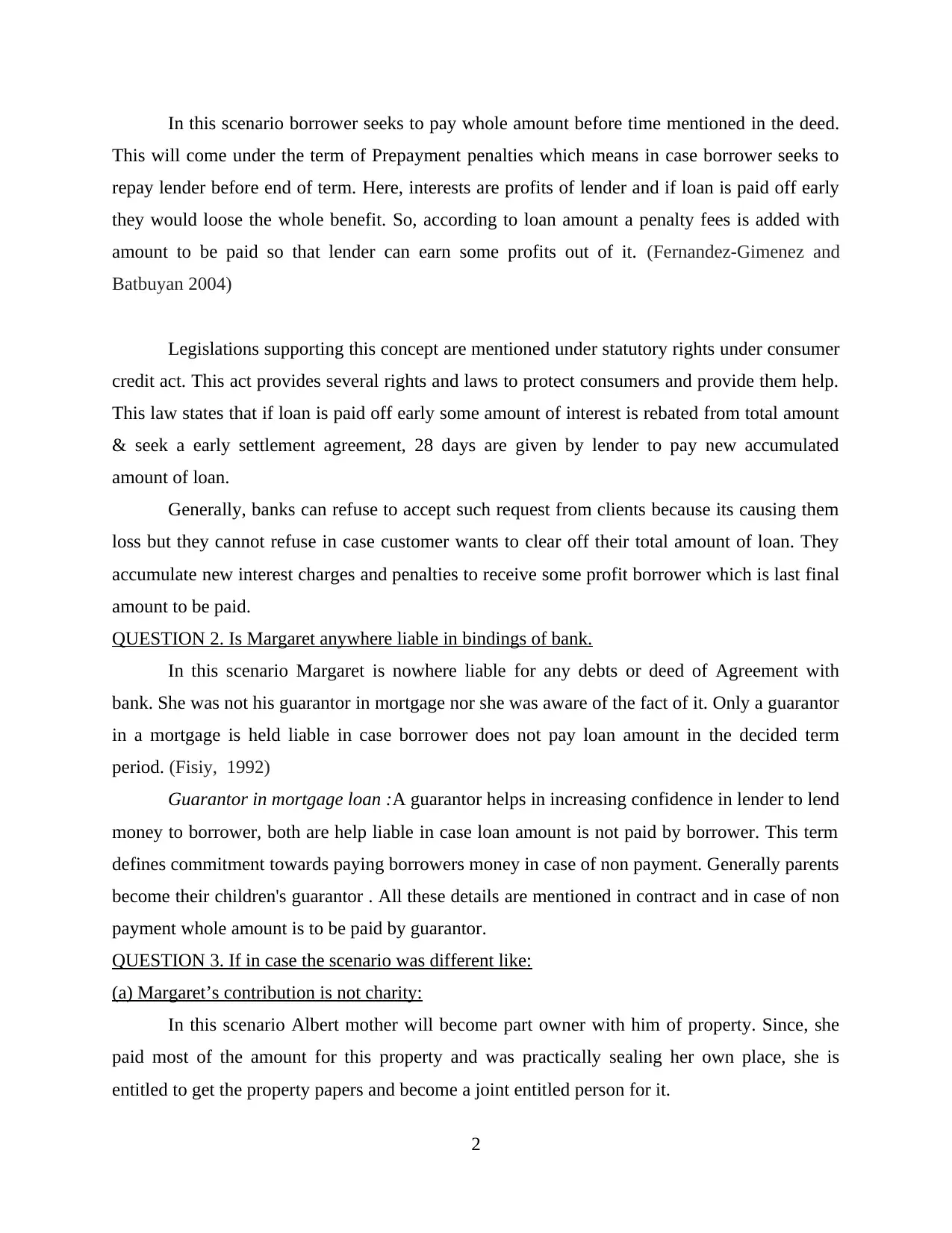
In this scenario borrower seeks to pay whole amount before time mentioned in the deed.
This will come under the term of Prepayment penalties which means in case borrower seeks to
repay lender before end of term. Here, interests are profits of lender and if loan is paid off early
they would loose the whole benefit. So, according to loan amount a penalty fees is added with
amount to be paid so that lender can earn some profits out of it. (Fernandez‐Gimenez and
Batbuyan 2004)
Legislations supporting this concept are mentioned under statutory rights under consumer
credit act. This act provides several rights and laws to protect consumers and provide them help.
This law states that if loan is paid off early some amount of interest is rebated from total amount
& seek a early settlement agreement, 28 days are given by lender to pay new accumulated
amount of loan.
Generally, banks can refuse to accept such request from clients because its causing them
loss but they cannot refuse in case customer wants to clear off their total amount of loan. They
accumulate new interest charges and penalties to receive some profit borrower which is last final
amount to be paid.
QUESTION 2. Is Margaret anywhere liable in bindings of bank.
In this scenario Margaret is nowhere liable for any debts or deed of Agreement with
bank. She was not his guarantor in mortgage nor she was aware of the fact of it. Only a guarantor
in a mortgage is held liable in case borrower does not pay loan amount in the decided term
period. (Fisiy, 1992)
Guarantor in mortgage loan :A guarantor helps in increasing confidence in lender to lend
money to borrower, both are help liable in case loan amount is not paid by borrower. This term
defines commitment towards paying borrowers money in case of non payment. Generally parents
become their children's guarantor . All these details are mentioned in contract and in case of non
payment whole amount is to be paid by guarantor.
QUESTION 3. If in case the scenario was different like:
(a) Margaret’s contribution is not charity:
In this scenario Albert mother will become part owner with him of property. Since, she
paid most of the amount for this property and was practically sealing her own place, she is
entitled to get the property papers and become a joint entitled person for it.
2
This will come under the term of Prepayment penalties which means in case borrower seeks to
repay lender before end of term. Here, interests are profits of lender and if loan is paid off early
they would loose the whole benefit. So, according to loan amount a penalty fees is added with
amount to be paid so that lender can earn some profits out of it. (Fernandez‐Gimenez and
Batbuyan 2004)
Legislations supporting this concept are mentioned under statutory rights under consumer
credit act. This act provides several rights and laws to protect consumers and provide them help.
This law states that if loan is paid off early some amount of interest is rebated from total amount
& seek a early settlement agreement, 28 days are given by lender to pay new accumulated
amount of loan.
Generally, banks can refuse to accept such request from clients because its causing them
loss but they cannot refuse in case customer wants to clear off their total amount of loan. They
accumulate new interest charges and penalties to receive some profit borrower which is last final
amount to be paid.
QUESTION 2. Is Margaret anywhere liable in bindings of bank.
In this scenario Margaret is nowhere liable for any debts or deed of Agreement with
bank. She was not his guarantor in mortgage nor she was aware of the fact of it. Only a guarantor
in a mortgage is held liable in case borrower does not pay loan amount in the decided term
period. (Fisiy, 1992)
Guarantor in mortgage loan :A guarantor helps in increasing confidence in lender to lend
money to borrower, both are help liable in case loan amount is not paid by borrower. This term
defines commitment towards paying borrowers money in case of non payment. Generally parents
become their children's guarantor . All these details are mentioned in contract and in case of non
payment whole amount is to be paid by guarantor.
QUESTION 3. If in case the scenario was different like:
(a) Margaret’s contribution is not charity:
In this scenario Albert mother will become part owner with him of property. Since, she
paid most of the amount for this property and was practically sealing her own place, she is
entitled to get the property papers and become a joint entitled person for it.
2
Secure Best Marks with AI Grader
Need help grading? Try our AI Grader for instant feedback on your assignments.
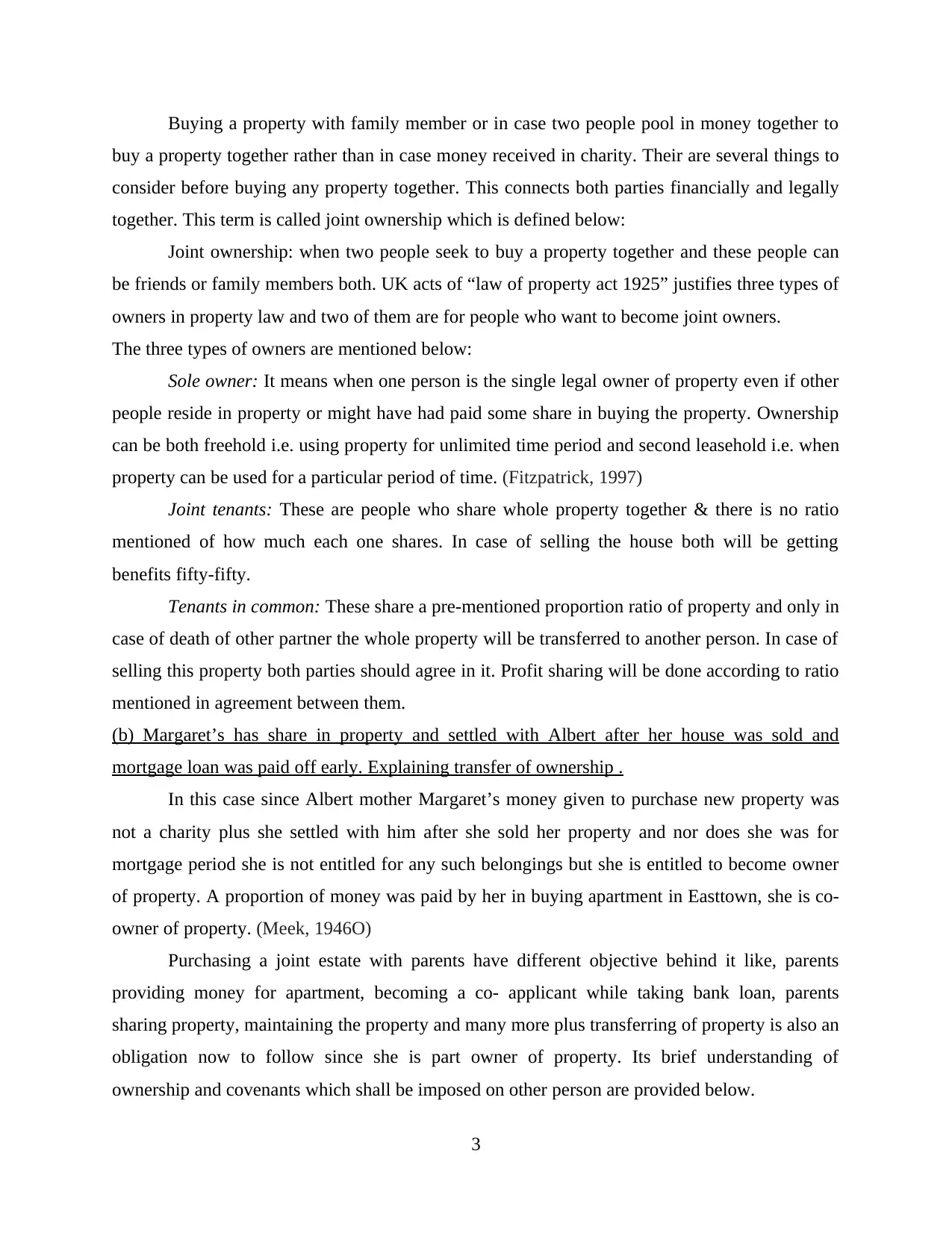
Buying a property with family member or in case two people pool in money together to
buy a property together rather than in case money received in charity. Their are several things to
consider before buying any property together. This connects both parties financially and legally
together. This term is called joint ownership which is defined below:
Joint ownership: when two people seek to buy a property together and these people can
be friends or family members both. UK acts of “law of property act 1925” justifies three types of
owners in property law and two of them are for people who want to become joint owners.
The three types of owners are mentioned below:
Sole owner: It means when one person is the single legal owner of property even if other
people reside in property or might have had paid some share in buying the property. Ownership
can be both freehold i.e. using property for unlimited time period and second leasehold i.e. when
property can be used for a particular period of time. (Fitzpatrick, 1997)
Joint tenants: These are people who share whole property together & there is no ratio
mentioned of how much each one shares. In case of selling the house both will be getting
benefits fifty-fifty.
Tenants in common: These share a pre-mentioned proportion ratio of property and only in
case of death of other partner the whole property will be transferred to another person. In case of
selling this property both parties should agree in it. Profit sharing will be done according to ratio
mentioned in agreement between them.
(b) Margaret’s has share in property and settled with Albert after her house was sold and
mortgage loan was paid off early. Explaining transfer of ownership .
In this case since Albert mother Margaret’s money given to purchase new property was
not a charity plus she settled with him after she sold her property and nor does she was for
mortgage period she is not entitled for any such belongings but she is entitled to become owner
of property. A proportion of money was paid by her in buying apartment in Easttown, she is co-
owner of property. (Meek, 1946O)
Purchasing a joint estate with parents have different objective behind it like, parents
providing money for apartment, becoming a co- applicant while taking bank loan, parents
sharing property, maintaining the property and many more plus transferring of property is also an
obligation now to follow since she is part owner of property. Its brief understanding of
ownership and covenants which shall be imposed on other person are provided below.
3
buy a property together rather than in case money received in charity. Their are several things to
consider before buying any property together. This connects both parties financially and legally
together. This term is called joint ownership which is defined below:
Joint ownership: when two people seek to buy a property together and these people can
be friends or family members both. UK acts of “law of property act 1925” justifies three types of
owners in property law and two of them are for people who want to become joint owners.
The three types of owners are mentioned below:
Sole owner: It means when one person is the single legal owner of property even if other
people reside in property or might have had paid some share in buying the property. Ownership
can be both freehold i.e. using property for unlimited time period and second leasehold i.e. when
property can be used for a particular period of time. (Fitzpatrick, 1997)
Joint tenants: These are people who share whole property together & there is no ratio
mentioned of how much each one shares. In case of selling the house both will be getting
benefits fifty-fifty.
Tenants in common: These share a pre-mentioned proportion ratio of property and only in
case of death of other partner the whole property will be transferred to another person. In case of
selling this property both parties should agree in it. Profit sharing will be done according to ratio
mentioned in agreement between them.
(b) Margaret’s has share in property and settled with Albert after her house was sold and
mortgage loan was paid off early. Explaining transfer of ownership .
In this case since Albert mother Margaret’s money given to purchase new property was
not a charity plus she settled with him after she sold her property and nor does she was for
mortgage period she is not entitled for any such belongings but she is entitled to become owner
of property. A proportion of money was paid by her in buying apartment in Easttown, she is co-
owner of property. (Meek, 1946O)
Purchasing a joint estate with parents have different objective behind it like, parents
providing money for apartment, becoming a co- applicant while taking bank loan, parents
sharing property, maintaining the property and many more plus transferring of property is also an
obligation now to follow since she is part owner of property. Its brief understanding of
ownership and covenants which shall be imposed on other person are provided below.
3
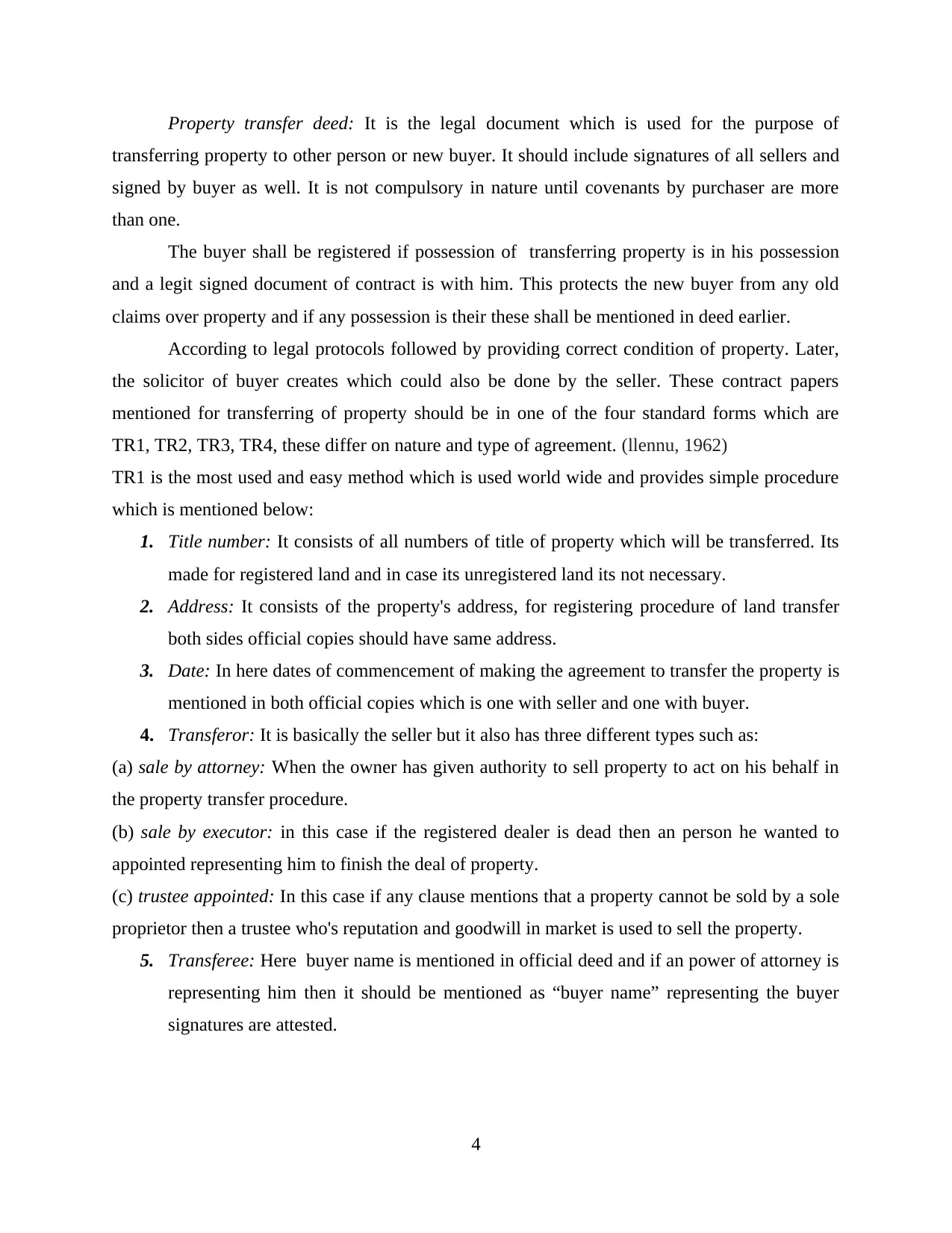
Property transfer deed: It is the legal document which is used for the purpose of
transferring property to other person or new buyer. It should include signatures of all sellers and
signed by buyer as well. It is not compulsory in nature until covenants by purchaser are more
than one.
The buyer shall be registered if possession of transferring property is in his possession
and a legit signed document of contract is with him. This protects the new buyer from any old
claims over property and if any possession is their these shall be mentioned in deed earlier.
According to legal protocols followed by providing correct condition of property. Later,
the solicitor of buyer creates which could also be done by the seller. These contract papers
mentioned for transferring of property should be in one of the four standard forms which are
TR1, TR2, TR3, TR4, these differ on nature and type of agreement. (llennu, 1962)
TR1 is the most used and easy method which is used world wide and provides simple procedure
which is mentioned below:
1. Title number: It consists of all numbers of title of property which will be transferred. Its
made for registered land and in case its unregistered land its not necessary.
2. Address: It consists of the property's address, for registering procedure of land transfer
both sides official copies should have same address.
3. Date: In here dates of commencement of making the agreement to transfer the property is
mentioned in both official copies which is one with seller and one with buyer.
4. Transferor: It is basically the seller but it also has three different types such as:
(a) sale by attorney: When the owner has given authority to sell property to act on his behalf in
the property transfer procedure.
(b) sale by executor: in this case if the registered dealer is dead then an person he wanted to
appointed representing him to finish the deal of property.
(c) trustee appointed: In this case if any clause mentions that a property cannot be sold by a sole
proprietor then a trustee who's reputation and goodwill in market is used to sell the property.
5. Transferee: Here buyer name is mentioned in official deed and if an power of attorney is
representing him then it should be mentioned as “buyer name” representing the buyer
signatures are attested.
4
transferring property to other person or new buyer. It should include signatures of all sellers and
signed by buyer as well. It is not compulsory in nature until covenants by purchaser are more
than one.
The buyer shall be registered if possession of transferring property is in his possession
and a legit signed document of contract is with him. This protects the new buyer from any old
claims over property and if any possession is their these shall be mentioned in deed earlier.
According to legal protocols followed by providing correct condition of property. Later,
the solicitor of buyer creates which could also be done by the seller. These contract papers
mentioned for transferring of property should be in one of the four standard forms which are
TR1, TR2, TR3, TR4, these differ on nature and type of agreement. (llennu, 1962)
TR1 is the most used and easy method which is used world wide and provides simple procedure
which is mentioned below:
1. Title number: It consists of all numbers of title of property which will be transferred. Its
made for registered land and in case its unregistered land its not necessary.
2. Address: It consists of the property's address, for registering procedure of land transfer
both sides official copies should have same address.
3. Date: In here dates of commencement of making the agreement to transfer the property is
mentioned in both official copies which is one with seller and one with buyer.
4. Transferor: It is basically the seller but it also has three different types such as:
(a) sale by attorney: When the owner has given authority to sell property to act on his behalf in
the property transfer procedure.
(b) sale by executor: in this case if the registered dealer is dead then an person he wanted to
appointed representing him to finish the deal of property.
(c) trustee appointed: In this case if any clause mentions that a property cannot be sold by a sole
proprietor then a trustee who's reputation and goodwill in market is used to sell the property.
5. Transferee: Here buyer name is mentioned in official deed and if an power of attorney is
representing him then it should be mentioned as “buyer name” representing the buyer
signatures are attested.
4
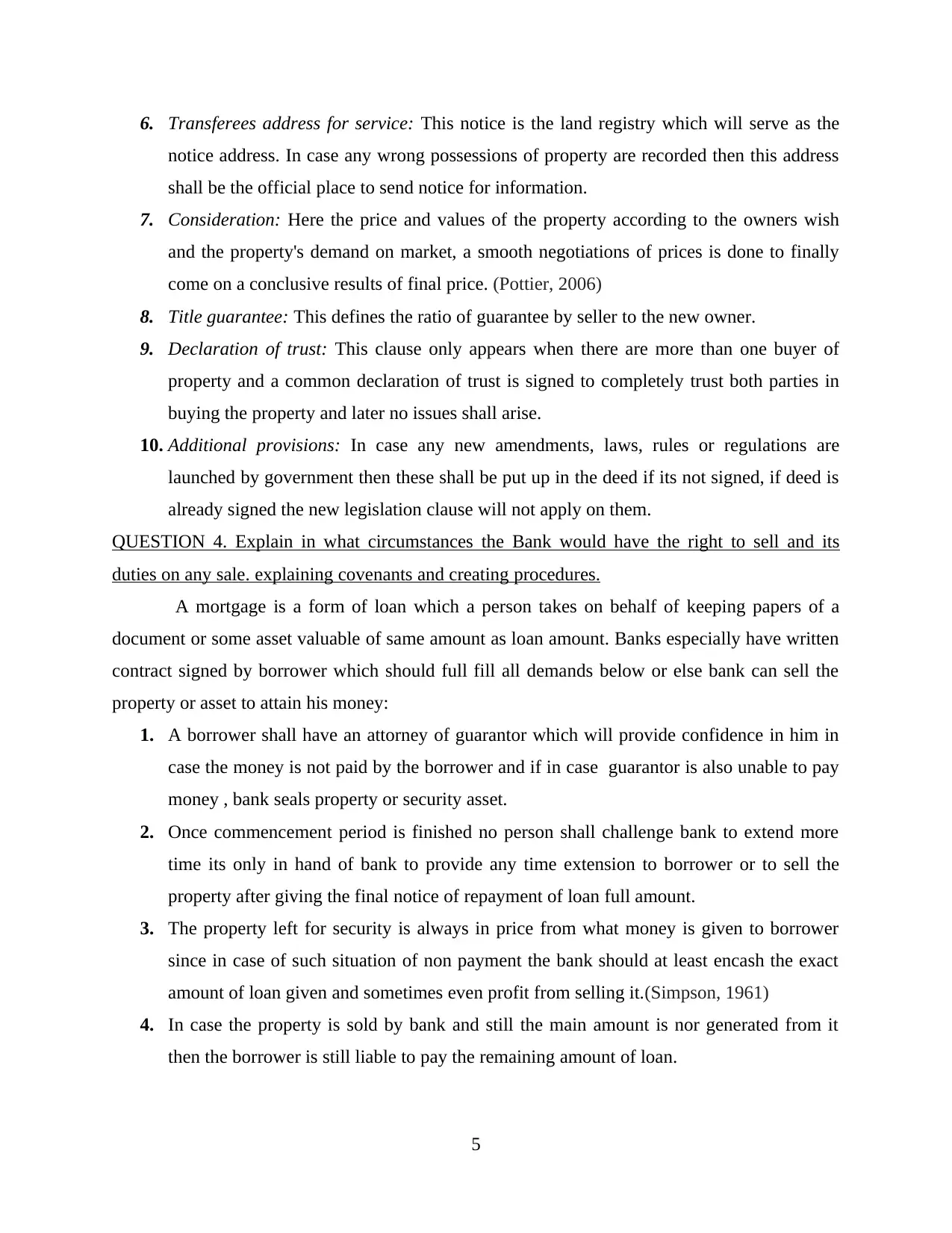
6. Transferees address for service: This notice is the land registry which will serve as the
notice address. In case any wrong possessions of property are recorded then this address
shall be the official place to send notice for information.
7. Consideration: Here the price and values of the property according to the owners wish
and the property's demand on market, a smooth negotiations of prices is done to finally
come on a conclusive results of final price. (Pottier, 2006)
8. Title guarantee: This defines the ratio of guarantee by seller to the new owner.
9. Declaration of trust: This clause only appears when there are more than one buyer of
property and a common declaration of trust is signed to completely trust both parties in
buying the property and later no issues shall arise.
10. Additional provisions: In case any new amendments, laws, rules or regulations are
launched by government then these shall be put up in the deed if its not signed, if deed is
already signed the new legislation clause will not apply on them.
QUESTION 4. Explain in what circumstances the Bank would have the right to sell and its
duties on any sale. explaining covenants and creating procedures.
A mortgage is a form of loan which a person takes on behalf of keeping papers of a
document or some asset valuable of same amount as loan amount. Banks especially have written
contract signed by borrower which should full fill all demands below or else bank can sell the
property or asset to attain his money:
1. A borrower shall have an attorney of guarantor which will provide confidence in him in
case the money is not paid by the borrower and if in case guarantor is also unable to pay
money , bank seals property or security asset.
2. Once commencement period is finished no person shall challenge bank to extend more
time its only in hand of bank to provide any time extension to borrower or to sell the
property after giving the final notice of repayment of loan full amount.
3. The property left for security is always in price from what money is given to borrower
since in case of such situation of non payment the bank should at least encash the exact
amount of loan given and sometimes even profit from selling it.(Simpson, 1961)
4. In case the property is sold by bank and still the main amount is nor generated from it
then the borrower is still liable to pay the remaining amount of loan.
5
notice address. In case any wrong possessions of property are recorded then this address
shall be the official place to send notice for information.
7. Consideration: Here the price and values of the property according to the owners wish
and the property's demand on market, a smooth negotiations of prices is done to finally
come on a conclusive results of final price. (Pottier, 2006)
8. Title guarantee: This defines the ratio of guarantee by seller to the new owner.
9. Declaration of trust: This clause only appears when there are more than one buyer of
property and a common declaration of trust is signed to completely trust both parties in
buying the property and later no issues shall arise.
10. Additional provisions: In case any new amendments, laws, rules or regulations are
launched by government then these shall be put up in the deed if its not signed, if deed is
already signed the new legislation clause will not apply on them.
QUESTION 4. Explain in what circumstances the Bank would have the right to sell and its
duties on any sale. explaining covenants and creating procedures.
A mortgage is a form of loan which a person takes on behalf of keeping papers of a
document or some asset valuable of same amount as loan amount. Banks especially have written
contract signed by borrower which should full fill all demands below or else bank can sell the
property or asset to attain his money:
1. A borrower shall have an attorney of guarantor which will provide confidence in him in
case the money is not paid by the borrower and if in case guarantor is also unable to pay
money , bank seals property or security asset.
2. Once commencement period is finished no person shall challenge bank to extend more
time its only in hand of bank to provide any time extension to borrower or to sell the
property after giving the final notice of repayment of loan full amount.
3. The property left for security is always in price from what money is given to borrower
since in case of such situation of non payment the bank should at least encash the exact
amount of loan given and sometimes even profit from selling it.(Simpson, 1961)
4. In case the property is sold by bank and still the main amount is nor generated from it
then the borrower is still liable to pay the remaining amount of loan.
5
Paraphrase This Document
Need a fresh take? Get an instant paraphrase of this document with our AI Paraphraser
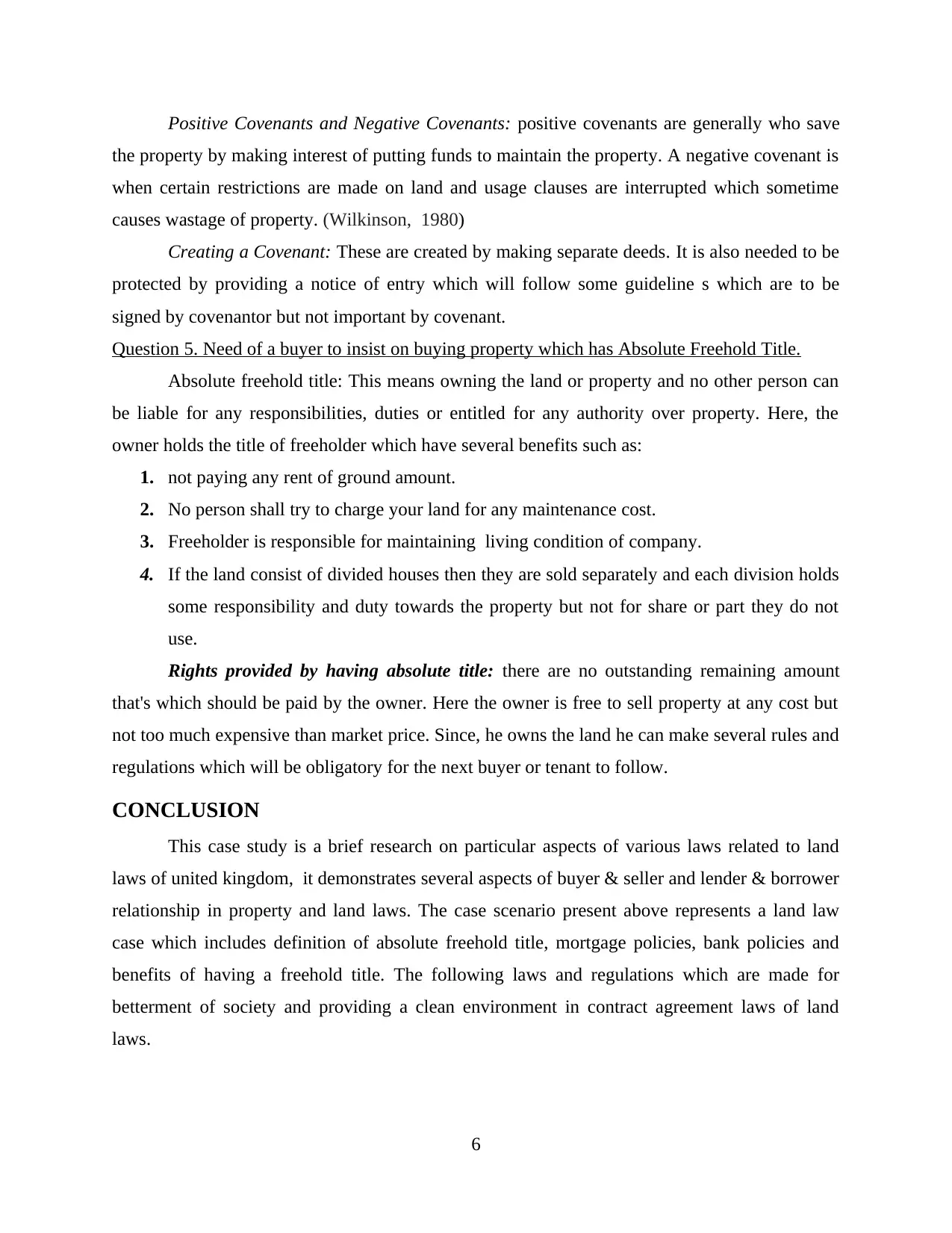
Positive Covenants and Negative Covenants: positive covenants are generally who save
the property by making interest of putting funds to maintain the property. A negative covenant is
when certain restrictions are made on land and usage clauses are interrupted which sometime
causes wastage of property. (Wilkinson, 1980)
Creating a Covenant: These are created by making separate deeds. It is also needed to be
protected by providing a notice of entry which will follow some guideline s which are to be
signed by covenantor but not important by covenant.
Question 5. Need of a buyer to insist on buying property which has Absolute Freehold Title.
Absolute freehold title: This means owning the land or property and no other person can
be liable for any responsibilities, duties or entitled for any authority over property. Here, the
owner holds the title of freeholder which have several benefits such as:
1. not paying any rent of ground amount.
2. No person shall try to charge your land for any maintenance cost.
3. Freeholder is responsible for maintaining living condition of company.
4. If the land consist of divided houses then they are sold separately and each division holds
some responsibility and duty towards the property but not for share or part they do not
use.
Rights provided by having absolute title: there are no outstanding remaining amount
that's which should be paid by the owner. Here the owner is free to sell property at any cost but
not too much expensive than market price. Since, he owns the land he can make several rules and
regulations which will be obligatory for the next buyer or tenant to follow.
CONCLUSION
This case study is a brief research on particular aspects of various laws related to land
laws of united kingdom, it demonstrates several aspects of buyer & seller and lender & borrower
relationship in property and land laws. The case scenario present above represents a land law
case which includes definition of absolute freehold title, mortgage policies, bank policies and
benefits of having a freehold title. The following laws and regulations which are made for
betterment of society and providing a clean environment in contract agreement laws of land
laws.
6
the property by making interest of putting funds to maintain the property. A negative covenant is
when certain restrictions are made on land and usage clauses are interrupted which sometime
causes wastage of property. (Wilkinson, 1980)
Creating a Covenant: These are created by making separate deeds. It is also needed to be
protected by providing a notice of entry which will follow some guideline s which are to be
signed by covenantor but not important by covenant.
Question 5. Need of a buyer to insist on buying property which has Absolute Freehold Title.
Absolute freehold title: This means owning the land or property and no other person can
be liable for any responsibilities, duties or entitled for any authority over property. Here, the
owner holds the title of freeholder which have several benefits such as:
1. not paying any rent of ground amount.
2. No person shall try to charge your land for any maintenance cost.
3. Freeholder is responsible for maintaining living condition of company.
4. If the land consist of divided houses then they are sold separately and each division holds
some responsibility and duty towards the property but not for share or part they do not
use.
Rights provided by having absolute title: there are no outstanding remaining amount
that's which should be paid by the owner. Here the owner is free to sell property at any cost but
not too much expensive than market price. Since, he owns the land he can make several rules and
regulations which will be obligatory for the next buyer or tenant to follow.
CONCLUSION
This case study is a brief research on particular aspects of various laws related to land
laws of united kingdom, it demonstrates several aspects of buyer & seller and lender & borrower
relationship in property and land laws. The case scenario present above represents a land law
case which includes definition of absolute freehold title, mortgage policies, bank policies and
benefits of having a freehold title. The following laws and regulations which are made for
betterment of society and providing a clean environment in contract agreement laws of land
laws.
6
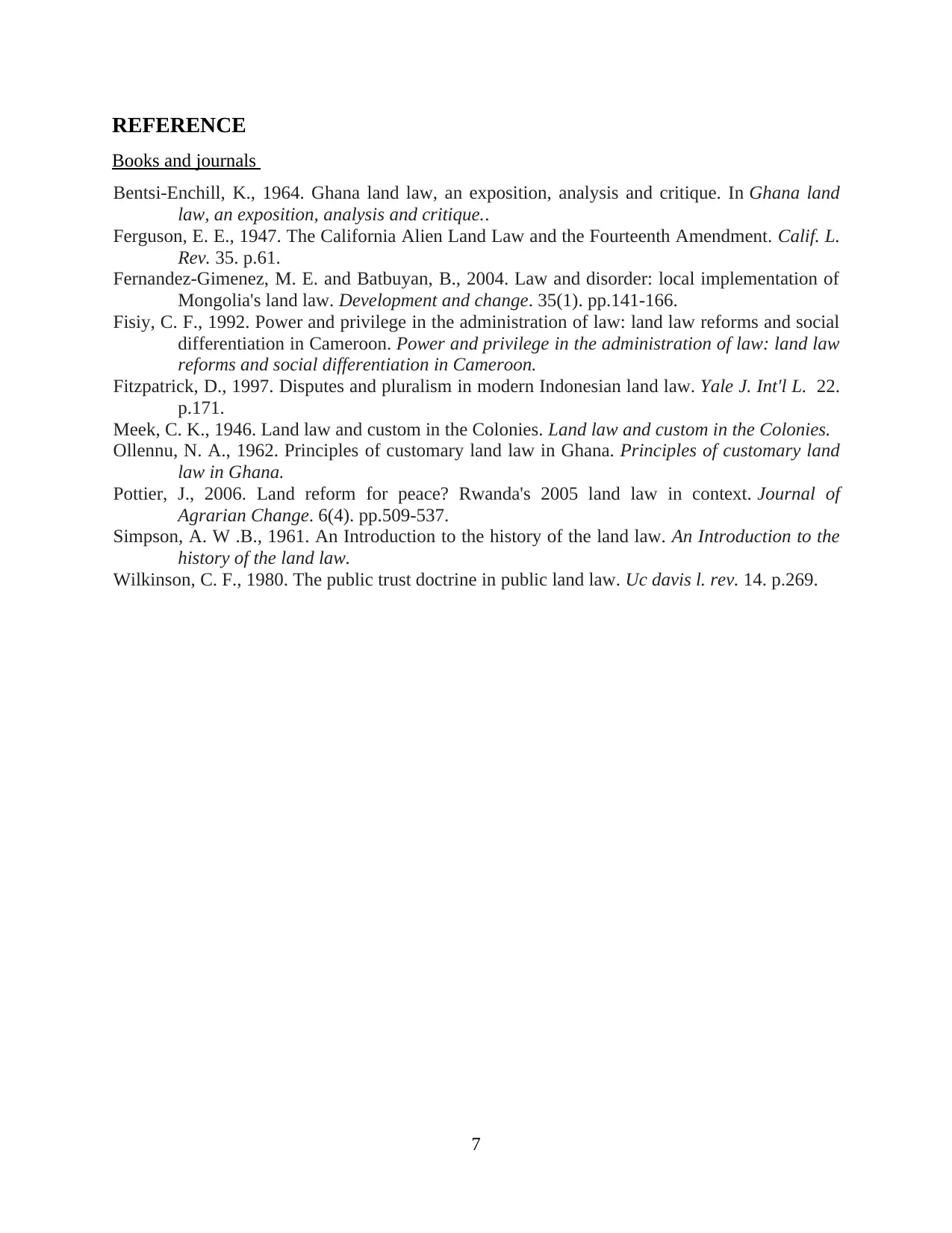
REFERENCE
Books and journals
Bentsi-Enchill, K., 1964. Ghana land law, an exposition, analysis and critique. In Ghana land
law, an exposition, analysis and critique..
Ferguson, E. E., 1947. The California Alien Land Law and the Fourteenth Amendment. Calif. L.
Rev. 35. p.61.
Fernandez‐Gimenez, M. E. and Batbuyan, B., 2004. Law and disorder: local implementation of
Mongolia's land law. Development and change. 35(1). pp.141-166.
Fisiy, C. F., 1992. Power and privilege in the administration of law: land law reforms and social
differentiation in Cameroon. Power and privilege in the administration of law: land law
reforms and social differentiation in Cameroon.
Fitzpatrick, D., 1997. Disputes and pluralism in modern Indonesian land law. Yale J. Int'l L. 22.
p.171.
Meek, C. K., 1946. Land law and custom in the Colonies. Land law and custom in the Colonies.
Ollennu, N. A., 1962. Principles of customary land law in Ghana. Principles of customary land
law in Ghana.
Pottier, J., 2006. Land reform for peace? Rwanda's 2005 land law in context. Journal of
Agrarian Change. 6(4). pp.509-537.
Simpson, A. W .B., 1961. An Introduction to the history of the land law. An Introduction to the
history of the land law.
Wilkinson, C. F., 1980. The public trust doctrine in public land law. Uc davis l. rev. 14. p.269.
7
Books and journals
Bentsi-Enchill, K., 1964. Ghana land law, an exposition, analysis and critique. In Ghana land
law, an exposition, analysis and critique..
Ferguson, E. E., 1947. The California Alien Land Law and the Fourteenth Amendment. Calif. L.
Rev. 35. p.61.
Fernandez‐Gimenez, M. E. and Batbuyan, B., 2004. Law and disorder: local implementation of
Mongolia's land law. Development and change. 35(1). pp.141-166.
Fisiy, C. F., 1992. Power and privilege in the administration of law: land law reforms and social
differentiation in Cameroon. Power and privilege in the administration of law: land law
reforms and social differentiation in Cameroon.
Fitzpatrick, D., 1997. Disputes and pluralism in modern Indonesian land law. Yale J. Int'l L. 22.
p.171.
Meek, C. K., 1946. Land law and custom in the Colonies. Land law and custom in the Colonies.
Ollennu, N. A., 1962. Principles of customary land law in Ghana. Principles of customary land
law in Ghana.
Pottier, J., 2006. Land reform for peace? Rwanda's 2005 land law in context. Journal of
Agrarian Change. 6(4). pp.509-537.
Simpson, A. W .B., 1961. An Introduction to the history of the land law. An Introduction to the
history of the land law.
Wilkinson, C. F., 1980. The public trust doctrine in public land law. Uc davis l. rev. 14. p.269.
7

8
1 out of 10
Related Documents
Your All-in-One AI-Powered Toolkit for Academic Success.
+13062052269
info@desklib.com
Available 24*7 on WhatsApp / Email
![[object Object]](/_next/static/media/star-bottom.7253800d.svg)
Unlock your academic potential
© 2024 | Zucol Services PVT LTD | All rights reserved.





